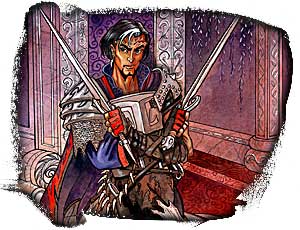Warlord: Saga of the Storm is the first collectible card game in years designed to grab and hold the attention of RPG, CCG, and miniature gaming fans everywhere. Based on a fast-playing card mechanic and packed with a deep "chess level" strategy, Warlord is the front-runner for Best CCG of the Year.
Set in the newly-created World of the Accord, Warlord chronicles the clash of mighty armies and the actions of great heroes as entire nations crumble around them. Developed by the award-winning AEG design staff, the world of Warlord is rich and inviting, providing the perfect backdrop for epic conflict as players battle it out for dominance.
The Story So Far...
The Elves were defeated 100 years ago in a war against the humans. In Corinth, the Andover capital, the archmage Syneri forced a geas upon the elves, removing their magic and destroying their undead army. The geas lasted for 100 years, which is over three generations of elves (who have a 30-year lifespan). When the geas ended, the bitter hatred of the Elves towards humans caused High Queen Tepheroth to declare war. Queen Alia of House Rowan (and loved by Rathe) was opposed, so Tepheroth exiled the entire House Rowan. Members either fled with Alia or were killed. The war began, and within three days, Andover was consumed in flames. Tepheroth's mentor is Dythanus, the spirit of the first necromancer and arch mage. Tepheroth seeks to restore him to life by recovering a magic orb in human lands. Morghen Dythanus is his son, now a lich.
The Nothrog, led by the shaman Lord Nassiral Hate, took advantage of the elf-human war by attacking and capturing the human city of Baraxton in the Southern Plains, crossroads and center of trade for the human lands. The attack began with a surprise slaughter of the city leaders in the Council chambers by Hate and his elite guard, with 10,000 Nothrog led by Krun hidden nearby using a Deverenian invisibility spell. Logan Ebonwoulfe, former head of the Baraxton's Thieves' Guild, is having troubles leading a surviving band of humans past the Nothrog and Elves to join the humans in the north. Hate's rule is not uncontested though. A legion of Nothrog sent to Sharn Keep fell under the control of a Reaver, a monstrous overlord and sorceror.
The Deverenian Empire once ruled most of the human lands, but fell apart from within over time. The current aging emporer seeks to regain its former glory by conquering human, elven, and Nothrog lands. Worship of the Storm has become a unifying ideology for the empire. So far they have conquered Tyraniel, the elven lands of House Rowan, and which are very close to the elven forest of Myreth. Unfortunately for the Deverenians, they lost the city of Phyrgai to a siege by the Dwarves, who got there before the Nothrog army led by Uthanak. The Deverenian Church has branded the Dwarves as demons. The Church includes an order of evil Paladins, led by Sir Rhawn d'Ilchant.
The Dwarves moved underground ages ago to guard the portal blocking the Abyssals, evil creatures that were once defeated but not destroyed. Now the Abyssals grow stronger, and have taken the Dwarfs' largest underground city. The Dwarves seek assistance above ground, but with little success so far. Coming to the surface near Phyrgai, and sensing the Deverenians were evil, they successfully seiged Phyrgai and have renamed it New Goldenaxe. The dwarves are aided underground by Sjonegaard, Lord of the Earth and King of the Elementals, who is summoning gargoyles from the very earth to fight on the side of good.
The Elves continued their war over six weeks, and destroyed most of the western human nations: Andover, Llyr, Toris Kelt, and Makappal. Tepheroth raised armies of undead in each destroyed kingdom, driving the humans towards the ocean. The remaining nations are now called the Free Kingdoms, led by Sir Robert the Vigilant. King Michael of Andover tried to sue for peace with Tepheroth under a flag of truce. But in a night called the "Assassins' Strike," people from all the races were killed; generals, leaders, priests, and even kings. Known casualties include King Michael and the High Lord of House Rowan. Sir Robert got his nickname by being the only survivor of the Strike. Rumor has it the Assassins' Strike was engineered by the Medusan Lords. It was carried out by Black Tom, the leader of the Thieve's Guild in Corinth and the entire Accordlands, and the leader of the Nightwalkers, the Assassin's Guild
There was also a Knightly Order of good Paladins, the Paladins of Aroch, in Llyr. Unfortunately, with Llyr in flames and the other Paladins dead from assassins, Terak Justicebringer is the last of his Order.
The strongest of the Mercenary guilds is the Dark Horsemen, led by Kerebrus. They don't seem to care for the Deverenians too much, mostly because the Empire isn't paying gold to hire them at the moment. The Yscar are a cult led by Yscar the Elder, a lycanthrope (shapeshifter).













